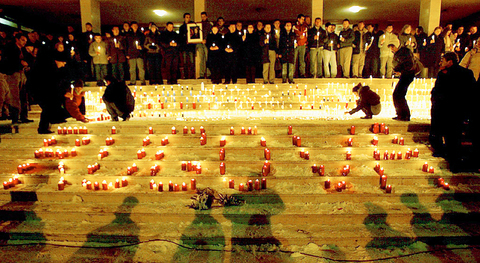Thousands of ethnic Albanians lit candles, placed flowers and flew flags at half mast yesterday in memory of Kosovo president Ibrahim Rugova, who led them for nearly two decades toward their demand for independence from Serbia.
With family at his bedside, Rugova, 61, died at his official residence shortly before midday on Saturday. He had suffered from lung cancer since September, when he was first diagnosed with the illness, and went through months of treatment.
Rugova will be buried on Wednesday in Kosovo's capital, Pristina. Five days of official mourning were declared, and mourners will be allowed to pay their last respects for two days at the parliament's headquarters.

PHOTO: EPA
Kosovo's lawmakers were to hold a commemorative session yesterday.
"Kosovo lost the president in the final run-up to independence," read the front page of Koha Ditore daily.
"There's no greater pain for the people of Kosovo," said 40 year-old Agim Zeka, a Pristina resident. "We have lost the great man."
Others like Jusuf Sina, appealed to the rest of the leaders to continue Rugova's path.
"He worked his entire life for our state," he said.
Rugova's death left a leadership vacuum in Kosovo's fraction-ridden political scene before crucial talks on whether the province should gain the independence that was his lifelong dream.
International leaders stepped up their appeals for calm and unity in the disputed UN-run province, fearing the death could trigger instability. The Serb government expressed concerns that Rugova's successor might not share his commitment to nonviolence.
The immediate effect of his death came almost immediately. The much-anticipated start of the talks between ethnic Albanians and Serb officials had been scheduled for Wednesday in Austria, but were postponed until next month.
The flags throughout Kosovo were lowered to half mast and long lines of tearful mourners visited his hillside residence in Pristina after the announcement of his death.
Rugova had been at the forefront of demands for independence since the early 1990s, when he started leading a nonviolent movement against the policies of Slobodan Milosevic, then president of Yugoslavia.
No other Kosovo politician has been held in such high regard. He won international respect through his peaceful opposition to Serb dominance, in contrast to other Kosovo Albanians now in positions of leadership, who were part of the rebel Kosovo Liberation Army that fought Serb troops.

IDENTITY: A sex extortion scandal involving Thai monks has deeply shaken public trust in the clergy, with 11 monks implicated in financial misconduct Reverence for the saffron-robed Buddhist monkhood is deeply woven into Thai society, but a sex extortion scandal has besmirched the clergy and left the devout questioning their faith. Thai police this week arrested a woman accused of bedding at least 11 monks in breach of their vows of celibacy, before blackmailing them with thousands of secretly taken photos of their trysts. The monks are said to have paid nearly US$12 million, funneled out of their monasteries, funded by donations from laypeople hoping to increase their merit and prospects for reincarnation. The scandal provoked outrage over hypocrisy in the monkhood, concern that their status

Trinidad and Tobago declared a new state of emergency on Friday after authorities accused a criminal network operating in prisons across the country of plotting to kill key government officials and attack public institutions. It is the second state of emergency to be declared in the twin-island republic in a matter of months. In December last year, authorities took similar action, citing concerns about gang violence. That state of emergency lasted until mid-April. Police said that smuggled cellphones enabled those involved in the plot to exchange encrypted messages. Months of intelligence gathering led investigators to believe the targets included senior police officers,

A disillusioned Japanese electorate feeling the economic pinch goes to the polls today, as a right-wing party promoting a “Japanese first” agenda gains popularity, with fears over foreigners becoming a major election issue. Birthed on YouTube during the COVID-19 pandemic, spreading conspiracy theories about vaccinations and a cabal of global elites, the Sanseito Party has widened its appeal ahead of today’s upper house vote — railing against immigration and dragging rhetoric that was once confined to Japan’s political fringes into the mainstream. Polls show the party might only secure 10 to 15 of the 125 seats up for grabs, but it is

Philippine President Ferdinand Marcos Jr is to meet US President Donald Trump this week, hoping Manila’s status as a key Asian ally would secure a more favorable trade deal before the deadline on Friday next week. Marcos would be the first Southeast Asian leader to meet Trump in his second term. Trump has already struck trade deals with two of Manila’s regional partners, Vietnam and Indonesia, driving tough bargains in trade talks even with close allies that Washington needs to keep onside in its strategic rivalry with China. “I expect our discussions to focus on security and defense, of course, but also